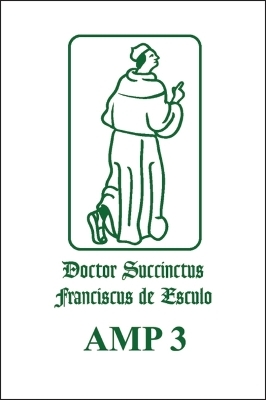
Francisci de Marchia
Leuven University Press (Verlag)
978-90-5867-847-8 (ISBN)
- Titel z.Zt. nicht lieferbar
- Versandkostenfrei innerhalb Deutschlands
- Auch auf Rechnung
- Verfügbarkeit in der Filiale vor Ort prüfen
- Artikel merken
Reduced Price!
Now only € 40,00 instead of € 85,00
The texts edited in this volume deal with angelology and anthropology, and particularly with the nature and the functions of immaterial substances like angels and the human rational soul. Marchia discusses such controversial issues as universal hylomorphism, i.e., whether angels and the rational soul are composed of both matter and form (q. 13), the immortality of the soul (qq. 18-19), and the nature and the object of the intellect and will (qq. 20, 21), as well as the functionality of the angelic intellect - whether angels understand through discursive reasoning (q. 23), and how they can speak with each other (q. 26). The problematic nature of the relationship between the material and the immaterial is approached through asking whether an angel can produce a material object (q. 22) and whether a material object can be the source of an angel's understanding of that object (q. 25). A particularly interesting treatment concerns how angels, immaterial substances, can be in a place (q. 16); this treatment includes Marchia's attempt to provide a physical theory explaining why an angel cannot move over some distance instantaneously.
Throughout these fifteen questions, Marchia challenges the ideas of some of the best minds of the later Middle Ages, not only major figures of the thirteenth century like Thomas Aquinas, Bonaventure, Henry of Ghent, and Giles of Rome but also fourteenth-century authors like John Duns Scotus, Hervaeus Natalis, Walter Burley, and Peter Auriol.
This publication is GPRC-labeled (Guaranteed Peer-ReviewedContent).
T. Suarez-Nani is Ordinary Professor of Philosophy at Université de Fribourg. W. Duba is a Swiss National Science Foundation Research Fellow at Université de Fribourg. E. Babey is a Ph.D. candidate at Université de Paris IV-Sorbonne and Université de Neuchâtel. Girard J. Etzkorn is a former professor emeritus at St. Bonaventure University. He died in 2023.
Introduction
I. Summary of the Themes Treated in Reportatio IIA, Questions 13-27
II. The Sources of Reportatio IIA, Questions 13 to 27
1. Explicit sources
2. Implicit sources
III. Case Studies of Implicit Sources
1. Question 15: The Somewhat-Subtle Doctor and Auriol's Ass
1.1. Article 1 and Peter Auriol, In II Sent., d. 3, q. 2
1.2. Article 2
1.2.1. Scotus and Scotism
1.2.2. Principia
1.2.2.1. Three arguments for positive (middle) specific unity
1.2.2.2. Arguments against positive (middle) unity
1.2.2.3. Auriol's objection?
1.2.3. To be determined later
2. Question 22: Auriol, Burley and the Refugium Miserorum
2.1. Four difficultates
2.2. The discussion in IV:23
2.2.1. Two opinions from Auriol
2.2.2. Walter Burley's Principium IV
2.2.2.1. Marchia and the Tractatus primus
2.2.2.2. Radulphus Brito's Quodlibet
2.2.3. Thomas Aquinas' view and Francis' solution
2.3. The four opinions of IIA:22
2.3.1. Opinions 1-3 and VII Metaphysics, comment 31
2.3.2. Opinion 4 and Marchia's view
2.4. Marchia's resolution and the refugium miserorum
3. Question 26: The Hidden Source of Non-Hidden Speech
IV. Notes on the Edition of Questions 13-27
V. Conclusion
VI. Editorial Conventions
Reportatio A in II Librum Sententiarum, qq. 13-27
Q. 13: Utrum angelus vel anima sit composita ex materia et forma
Q. 14: Utrum in substantiis separatis possint esse plura individua in eadem specie
Q. 15: Utrum angeli sint compositi ex actu et potentia
Q. 16: Utrum angelus per se sit in loco vel tantum per accidens
Q. 17: Utrum potentiae sensitivae in homine et in aliis animalibus sint eiusdem speciei
Q. 18: Utrum intellectus sive anima intellectiva sit immortalis
Q. 19: Utrum immortalitas animae possit naturaliter de ipsa anima demonstrari a priori vel a posteriori
Q. 20: Utrum intellectus et voluntas in homine et in angelo sint eiusdem rationis
Q. 21: Utrum idem sit obiectum intellectus et voluntatis
Q. 22: Utrum angelus possit causare effective aliquam formam substantialem materialem
Q. 23: Utrum angelus intelligat componendo et dividendo per discursum syllogisticum vel non
Q. 24: Utrum voluntas daemonis sit obstinata sic quod necessario velit malum ex immobili apprehensione intellectus vel ex aliquo habitu necessitante voluntatem ad malum
Q. 25: Utrum obiectum aliquod materiale possit aliquid causare in intellectu angeli
Q. 26: Utrum angelus loquens causet in illo cui loquitur actum intelligendi
Q. 27: Utrum unus angelus possit videre seu intelligere cogitationes alterius angeli
Bibliography
Primary Sources
Secondary Sources
Indices
I. Index Biblicus
II Index Auctoritatum
III. Index Codicum Manuscriptorum
IV. Index Nominum et Locorum
| Reihe/Serie | Ancient and Medieval Philosophy–Series 3: Francisci de Marchia Opera Philosophica et Theologica |
|---|---|
| Verlagsort | Leuven |
| Sprache | englisch |
| Maße | 152 x 229 mm |
| Themenwelt | Geisteswissenschaften ► Philosophie ► Philosophie Altertum / Antike |
| Geisteswissenschaften ► Philosophie ► Philosophie des Mittelalters | |
| ISBN-10 | 90-5867-847-4 / 9058678474 |
| ISBN-13 | 978-90-5867-847-8 / 9789058678478 |
| Zustand | Neuware |
| Haben Sie eine Frage zum Produkt? |
aus dem Bereich


